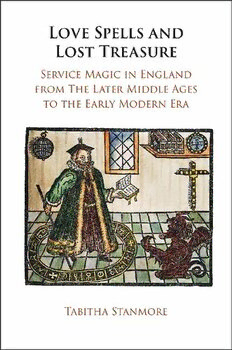
Love Spells and Lost Treasure: Service Magic in England from the Later Middle Ages to the Early Modern Era PDF
324 Pages·2022·3.8 MB·English
Most books are stored in the elastic cloud where traffic is expensive. For this reason, we have a limit on daily download.
Preview Love Spells and Lost Treasure: Service Magic in England from the Later Middle Ages to the Early Modern Era
Description:
Magic is ubiquitous across the world and throughout history. Yet if witchcraft is acknowledged as a persistent presence in the medieval and early modern eras, practical magic by contrast – performed to a useful end for payment, and actually more common than malign spellcasting – has been overlooked. Exploring many hundred instances of daily magical usage, and setting these alongside a range of imaginative and didactic literatures, Tabitha Stanmore demonstrates the entrenched nature of 'service' magic in premodern English society. This, she shows, was a type of spellcraft for needs that nothing else could address: one well established by the time of the infamous witch trials. The book explores perceptions of magical practitioners by clients and neighbours, and the way such magic was utilised by everyone: from lowliest labourer to highest lord. Stanmore reveals that – even if technically illicit – magic was for most people an accepted, even welcome, aspect of everyday life.
See more
The list of books you might like
Most books are stored in the elastic cloud where traffic is expensive. For this reason, we have a limit on daily download.
